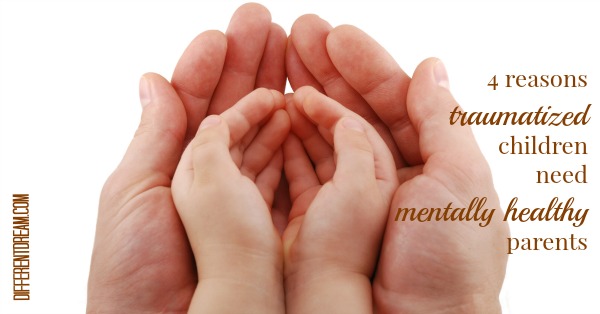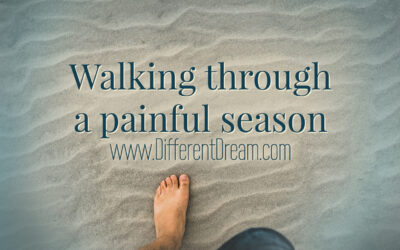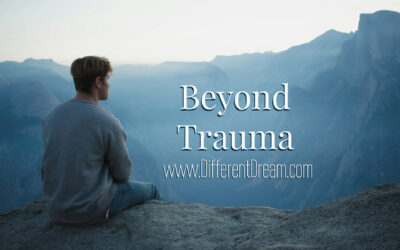4 Reasons Traumatized Kids Need Mentally Healthy Parents

Thank you for stopping in to read the twelfth article in this series about PTSD in children. The first ten posts in this series focused exclusively on PTSD in children. However last week’s post was about what parents can do to advocate effectively for traumatized children. This post continues in the same vein by examining why kids with PTSD need mentally healthy parents–a reality I first began to deal with after our son’s PTSD treatment in 2006.
One day, I was sitting in the waiting room of the clinic where our son was being treated for PTSD waiting to take him to lunch. One of the therapists strolled in and stood in front of me.
“Are things going okay?” I asked.
“Very well.” He nodded and held my gaze. “But what about you, Mom? How are you doing with all this?”
The question caught me off guard. Our son had been the one the surgeons, doctors, nurses, and x-ray techs wanted to know about since the day of his birth No one had ever asked about me. Or my husband.
“Me?” I stammered. “I’m fine. You’ve done so much for our son this week. I’ve never been better.”
“Really?” the therapist mused. “That’s interesting.”
Just then, our son came into the waiting room and the conversation ended. In the years since our encounter, I have mulled over that unexpected question many times. The mere asking of it somehow gave me permission to admit I’d experienced trauma as a mom. The more I thought about it, the more my tendency to avoid visiting people in the hospital made sense. I came to understood why my pulse quickened and my stomach knotted for years when my now-stable and responsible son called and said, “Hi, Mom.”
Eventually, through treatment and practice, I eventually learned to confront and process my experiences. As it turns out, recent research proves highlights several reasons why traumatized children need mentally healthy parents. Here are just a few.
Reason #1: Children of mothers with PTSD are at higher risk of developing PTSD. After the 2013 missile attacks in Israel, researchers found that the children of mothers who developed PTSD after the attacks were at much higher risk of developing PTSD than other children.
To read the rest of this post, go to Key Ministry’s blog, Church4EveryChild.
Part 1: Writing About PTSD Was Not on My Bucket List
Part 2: Childhood Trauma by Any Other Name Is Still Traumatic
Part 3: 10 Myths about PTSD in Children
Part 4: What Causes PTSD in Children
Part 5: A Look Inside the Brain’s Response to Childhood Trauma
Part 6: Why the Spotlight Is on PTSD in Children
Part 7: Childhood PTSD Symptoms in Tots, Teens, and In Between
Part 8: Why and How Childhood PTSD Is often Misdiagnosed
Part 9: Effective Treatment of PTSD in Children
Part 10: How to Prevent PTSD in Traumatized Children
Part 11: How Parents Can Advocate Effectively for Traumatized Children
Part 12: 4 Reasons Traumatized Kids Need Mentally Healthy Parents
Part 13: Clinging to Faith While Parenting Children with PTSD
Do you like what you see at DifferentDream.com? You can receive more great content by subscribing to the quarterly Different Dream newsletter and signing up for the daily RSS feed delivered to your email inbox. You can sign up for the first in the pop up box and the second at the bottom of this page.
By Jolene
Jolene Philo is the author of the Different Dream series for parents of kids with special needs. She speaks at parenting and special needs conferences around the country. She’s also the creator and host of the Different Dream website. Sharing Love Abundantly With Special Needs Families: The 5 Love Languages® for Parents Raising Children with Disabilities, which she co-authored with Dr. Gary Chapman, was released in August of 2019 and is available at local bookstores, their bookstore website, and at Amazon.
1 Comment
Submit a Comment
Subscribe for Updates from Jolene
Related Posts
How Do I Let Go of My Adult EA/TEF Child?
Valeria Conshafter explores the question “How do I let go of my adult EA/TEF child?” for EA/TEF Awareness Month.
The Physical Manifestations of Grief in Caregivers
Jolene explains how the heaviness of loss and sorrow can contribute to the physical manifestations of grief in caregivers.
Experiencing Post-Traumatic Growth while Raising a Child with Disabilities
Jolene explains the benefits of experiencing post-traumatic growth while raising a child with disabilities.






I was just talking about this at my blog, too! Thanks for sharing with us!